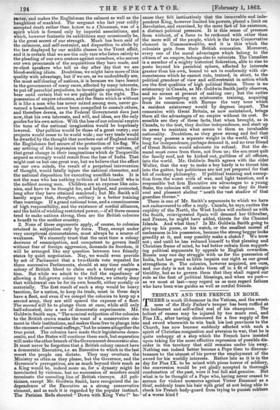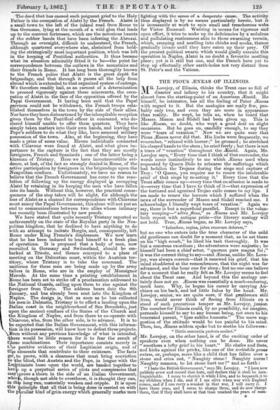TRISTANY AND THE FRENCH IN ROMTI.
THERE is much ill-humour in the Vatican, and the sweetness of the Holy Father's temper has been ruffled at the indiscreet and self-willed zeal of his champions. The holiest of causes may be injured by too much zeal, and Pius IX., after having clamoured for a free supply of fire and sword wherewith to win back his lost provinces to the Church, has now become suddenly affected with such a spirit of Christian resignation and aversion to war, that he is quite unhappy at a step which the French have insisted upon taking for the more effective repression of possible disorder in the territory that still remains under his sway. Nothing can indeed better become a Pope than to discountenance to the utmost of his power the employment of the sword for his worldly interests. Rather late as it is in the day for Pius IX. to be seized with pious horror of soldiery, the conversion would be yet gladly accepted in thorough condonation of the past, were it but full and genuine. But what is to be thought of a Pope who, baying never ceased to scream for violent measures against Victor Emanuel as a thief, suddenly tears his hair with grief at not being able to check his French body-guard from trying to punish robbers of a worse kind ? The deed that has caused such poignant grief to the Holy Father is the occupation of Alatri by the French. Alatri is a small town to the left of the inland road from Rome to San Germano, lying at the mouth of a wild glen that leads up to the convent fortresses, which are the notorious haunts of the robber bands that have been infesting the Abruzzi. Through an oversight, difficult to understand, the French, although quartered everywhere else, abstained from holding the strategically most important position, which was left in the keeping of Pontifical authorities. It thus became what its situation admirably fitted it to be—the point for correspondence between the outlaws in the mountains and their friends in Rome. It has long been thoroughly known to the French police that .Alatri is the great depot for brigandage, and that through it passes all the help from abroad which is extended to that organized system of outrage. We therefore readily hail, as an earnest of a determination to proceed vigorously against these miscreants, the occupation of Alatri in the face of the opposition offered by the Papal Government. It having been said that the Papal garrison could not be withdrawn, the French troops established themselves in the town by the side of their allies. Nor have theybeen disheartened by the inhospitable reception given them by the Pontifical officer in command, who declared himself unable to offer them quarters. They have simply taken matters into their own hands, and leaving the Pope's soldiers to do what they like, have assumed military possession of the town. Also at the beginning, they have made a prize of some value. Eleven individuals connected with Chiavone were found at Alatri, and what gives importance to the capture is the fact that they are mostly foreigners, French ahd. Spaniards ; one of the latter being a kinsman of Tristany. Here we have incontrovertible evidence, at last, of the fact so strongly denied in Rome, of the active participation by foreigners in the brigandage upon the Neapolitan confines. Unfortunately, we have no reason to believe that the French Government has comelo the resolution of following up the energy displayed i,p. occupying Alatri by retaining in its keeping the men who have fallen into its hands. Without this, however, the practical consequences of the step taken will be slight, for although the loss of Alatri as a channel for correspondence with Chiavone must annoy the Papal Government, this alone will not put an end to communications between two allies whose intimacy has recently been illustrated by new proofs.
We have stated that quite recently Tristany reported so unfavourably on the state of the Royalist party in the Neapolitan kingdom, that he declined to have anything to do with an attempt to imitate Borges, and, consequently, left Rome under, King Francis's displeasure. We now learn that he has been induced to lend himself to a fresh plan of operations. It is proposed that a body of men, now recruited in Germany and Switzerland, should be embarked at Trieste, and thence conveyed to a place of meeting on the Dalmatian coast, within the Austrian territory, where Tristany is to take the command. The uniforms for these men are being made up by the army tailors in Rome, who are in the employ of Monsignor Merode. At the same time a printing establishment in Rome has been set to strike off a proclamation addressed to the National Guards calling upon them to rise against the foreigner from Turin. The address bears date the 8th January, and has already been sent into the Kingdom of (11.1 Naples. The design is, that as soon as he has collected his men in Dalmatia, Tristany is to effect a landing upon the Italian coast in the neighbourhood of San Benedetto, just upon the ancient confines of the States of the Church and the Kingdom of Naples, and from there to co-operate with Chiavone, who, from the other side, is to advance. It is to be expected that the Italian Government, with this information in its possession, will know how to defeat these projects. Even without any previous knowledge of what is intended, i here would be little reason for it to fear the result of these machinations. Their importance consists merely in t, e positive evidence of their Legitimist origin, and of e elements that contribute to their existence. The facts goto prove, with a clearness that must bring conviction to ihe blind, that Austria and the Pope, in league with the LeE itimists loose upon the world, are banded together to keep up a perpetual series of plots and conspiracies that prove a thorn in the side of an Italian Government, though not able to overthrow, it is thought they can, long run, materially weaken and cripple. It is upon rinciple that all that is being done is carried on with culiar kind of grim energy which generally marks men may whir in th this the p fighting with the sense of a desperate cause. The activity thus displayed is by no means particularly heroic, but it is incessantly at work to spin small and treacherous webs for Victor Emanuel. Wanting in means for vigorous and open effort, it tries to make up its deficiencies by a sedulous and pullulating restlessness akin to those swarming vermin, which, creeping and nestling into chinks and nooks, thence gradually invade until they have eaten up their prey. Of the present political swarm which would gladly execute this operation in Naples, Alatri is no doubt a favourite nestling place; yet is it still but one, and the French have yet to stop up effectually other earth-holes not very distant from St. Peter's and the Vatican.































 Previous page
Previous page